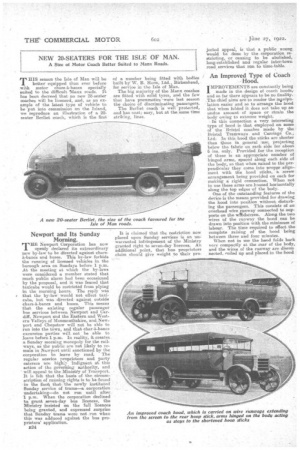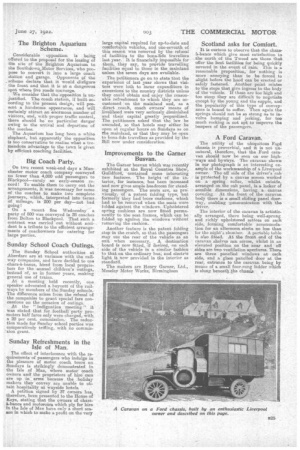NEW 20-SEATERS FOR THE ISLE OF MAN.
Page 22

Page 23

If you've noticed an error in this article please click here to report it so we can fix it.
A Size of Motor Coach Better Suited to Manx Roads.
.. ..... . ... .. .. . .......... .... ..
THIS season the Isle of Man will be better' equipped than ever before with motor chare-iabancs specially suited to the difficult 'Manx reads. It has been decreed that no new 28-seater coaches will be licensed, and, as an example of the latest type of vehicle to be put into commission on the Island, we reproduce an illustration of a 20seater Berliet coach, which is the first Newport and Its Sunday Morning. TILE Newport Corporation has now openly declared its extraordinary new by-law to be directed against charsa-bancs and buses. This by-law forbids the running of licensed vehicles in the borough area on Sundays before 1 p.m. At the meeting at which the by-laws were considered a member stated that much public alarm had been occasioned by the proposal, and it was feared that taxicabs would be restricted from plying in the morning hours. The reply was that the by-law would not effect taxicabs, but was directed against outside ehars4-bancs and buses. This means that the existing regular passenger bus services between Newport and Cardiff, Newport and the Eastern and Western Valleys of Monmouthshire, and Newport and Chepstow will not be able to run into the town, and -that char-&-banes excursion parties will, not be able to leave before 1 p.m. In reality, it creates a Sunday morning monopoly for the railways, as the public are not likely to remain in Newport until sanctioned by the corporation to leave by road. The regular seavice proprietors and party caterers are high::) indignant at this action of the governing authority, and will appeal to the Ministry of Transport. It is felt that the basis of the circumscription of running rights is to be found in the ifact‘ that the newly instituted Sunday service of trains—a corporation undertaking—do not run until after 1 p.m. When the corporation declined to grant seven-day bus licences, the Ministry insisted on the full licences being granted, and expressed surprise that Sunday trams were not run when this was adduced against the bus proprietors' application.
B24 of a number being fitted with bodies built by' W. B. Horn, Ltd., Birkenhead, for service in the Isle of Man.
The big majority of the Manx coaches are fitted with solid tyres, and the few that have pneumatics were last season the choice of discriminating passengers. The Berliet coach is well protected, and has neat; easy, but at the same time striking, lines.
It is claimed that the restriction now placed upon Sunday services is an uriwarranted infringement of the Ministry granted right ta seven-day licences. An additional point, that bus proprietors claim should give weight to their pro jected appeal, is that a public wrong would be done by the corporation restricting, or causing to be abolished, long-established and regular inter-town road services that ran to time-table.
An Improved Type of Coach .Hood,
I MPROVEMENTS are constantly being
made in the design of coach hoods, and so fax there appears to be no finality. The chief aims are to render the monipulation easier and so to arrange the hood that when folded it does not take up an undue amount. of space or strain the body owing to extreme weight. In this connection a very interesting type of hood is that employed on some of the Bristiol coaches made by the Bristol Tramways and Carriage Co., Ltd. In this hood the sticks are shorter than those in general use, projecting below the fabric on each side for about 6 Ms. only. Provided for the reception of these is an appropriate number of binged arms, spaced along each side of the body, so that when raised to the perpendicular they coma into eropeir alignment. with the hood sticks, a screw arrangement being provided on each for making a rigid connection. When not in use these arms are housed horizontally along the top edges of the body.
One of the outstanding features of the device is the means provided for drawing the hood into position without. disturbing the passengers. This consists of an overhead wire runway connected to supports on the witalscreen. Along the two wires of the runway the hood can be drawn into position with the minimum of labour. The time required to effect the complete raising of the hood being between three and four minutes.
When not in use the hood folds back very compactly at the rear of the body, and the wires of the runway are discon fleeted, roiled up and placed in the hood
The Brighton Aquarium Scheme.
Considerable opposition is being offered to the proposal for the leasing of the site of the Brighton Aquarium to the Southdown.Motor Services, who propose to convert it into a large coach station and garage. Opponents of the scheme declare that it would disfigure the front and that it is at a dangerous *pot where five roads converge. We consider that the opposition is unjustified. The cowl station, if built according to the present design, will present a handsome appearance, and will certainly attract an enormous number of visitors, and, with proper traffic control, there should be' no particular danger owing to the arrival and departure of the coaches.
The Aquarium has long been a white elephant, but apparently the opposition is too conservative to realize what a tremendous advantage to the town is given her efficient coaching facilities.
Big Coach Party.
On two recent week-end days a Manchester motor coach company conveyed no fewer than 4,000 odd passengers to Blackpool—surely an early-season record! To enable them to carry out the arrangements, it was necessary for some of the coaches to make two complete journeys, which, interpreted into terms of mileage, is 200 per day—not bad going !
On a recent fine Wednesday a party of 800 was conveyed in 28 coaches from Bolton to Blackpool. That such a contract was carried out without accident is a tribute to the efficient arrangements of coachowners for catering for large parties.
Sunday School Coach Outings.
The Sunday School authorities at Aberdare are at variance with the railway companies, and have decided to use chars-a-basics, hired from local proprietors for the annual children's outings, instead of, as in former years, making general use of trains.
At a meeting held recently, one speaker advocated a boycott of the railways by members of the Sunday schools. The difference arises from the refusal of the companies to grant special fare concessions on the occasion of outings.
At the "indignation meeting" it was stated that for football-party promoters half fares only were charged, with a 20 per cent. commission. The reduction made for Sunday school parties was comparatively trifling, with no commission grant.
Sunday Refreshments in the Isle of Man.
The effect of interference with the requirements of passengers who indulge in the pleasure of motor coach, tours on Sundays is strikingly demonstrated in the Isle of Man, where motor coach owners and the proprietors of hire cars are up in arms because the holiday makers they convey are unable to obtain hospitality at wayside hotels. A petition signed by 37 owners has, therefore, been presented to the House of Keys, stating that the owners of charsa-bance and motorcars which ply for hire in the Isle of Man have only a short season in which to make a profit on the very large capital required for up-to-date and comfortable vehicles, and one-seventh of this season was removed by the refusal of facilities to the bona-fide travellers last year. It is financially impossible for them, they say, to provide travelling facilities equal to those in the mainland unless the seven days are available.
The petitioners go on to state that the experience of last year shows that visitors were loth to incur expenditure in excursions to the country districts unless they could obtain and enjoy the reasonable refreshment to which they are accustomed on the mainland and, as a direct result, coach owners' means of livelihood were very seriously diminished and their capital greatly jeopardized. The petitioners asked that the law be amended, so that hotels may either be open at regular hours. on Sundays as on the mainland, or that they may be open to bona-fide travellers as provided by the Bill now under consideration.
Improvements to the Garner Busvan.
The Garner busvan which was recently exhibited at the Royal Counties Show, Guildford, contained some interesting new features. The height of the interior, for instance, has been increased and now gives ample headroom for standing passengers. The seats are, as previously, of a patent folding type, but formerly they had loose cushions, which had to be removed when the seats were folded against the windows. Upholstered spring cushions are now fitted permanently to the seat frames, which can be folded up against the windows without removing the cushion.
Another feature is the patent folding step in the cratch, so that the passengers may use the rear of the vehicle as an exit when neeessary. A destination board is now fitted, if desired, on each side of the vehicle in a similar fashion to that on the ordinary bus, and electric light is now provided in the interior as standard.
The makers are Henry Garner, Ltd., Moseley Motor Works, Birmingham
Scotland asks for Comfort.
It is curious to observe that the charsa-bancs which give most satisfaction to the north of the Tweed are those that . offer the best facilities for• being quickly covered in the event of rain. This is a reasonable proposition, for nothing is more annoying than to be forced to alight before the hood can be erected or safely fastened. Another point relates to the steps that give ingress to the body of the vehicle. If these are too high and too steep they are difficult to negotiate except by the young and the supple, and the popularity of this type of conveyance is bound to suffer. Then again the springs should not be so strong as to involve bumping and jerking, for too much rocking is not apt to improve the tempers of the passengers.
A Ford Caravan.
The utility of the ubiquitous Ford chassis is proverbial, and it is not unnatural, therefore, that the Ford caravan should now be seen on our high-ways and byways. The caravan shown in our photograph is an interesting example of the workmanship of a Liverpool owner. The off side of the driver's cab is pretected by a canvas screen worked on a. spring roller, whilst outside, arranged on the cab panel, is a locker of sensible dimensions, having, a canvas covering. At the front of the caravan body there is a small sliding panel doorway, enabling aommunication with the driver.
The interior of the caravan is artistically arranged, there being well-sprung and richly upholstered settees on each side, forming comfortable accommodation for an afternoon siesta no less than for the night's slumber. A portable table is also fitted. At the front end of the caravan shelves stin across, whilst in an elevated position on the near and off sides are two ventilation apertures. There are three panelled windows at each side, and a glass panelled door at the rear, entrance to the caravan being by means of a small four-rung ladder Which is slung beneath the chassmi






























